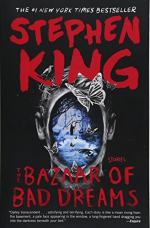|
This section contains 611 words (approx. 2 pages at 400 words per page) |

|
The Bazaar of Bad Dreams Summary & Study Guide Description
The Bazaar of Bad Dreams Summary & Study Guide includes comprehensive information and analysis to help you understand the book. This study guide contains the following sections:
This detailed literature summary also contains Quotes and a Free Quiz on The Bazaar of Bad Dreams by Stephen King.
The following version of this collection of short stories was used to create this study guide: King, Stephen. Bazaar of Bad Dreams. Scribner, Nov. 3, 2015. Kindle.
The collection of stories The Bazaar of Bad Dreams by Stephen King includes stories ranging in topic from the more mundane, like baseball and neighborhood rivalry, to the fantastical stories of a killer car and a Kindle that connects with other realities. The 21 stories in the collection are framed by King’s commentary on his inspiration for each of them.
In “Mile 81,” three children have to take matters into their own hands when the adults refuse to believe them when they say that the station wagon pulled into an abandoned rest stop is killing people.
In the story “Premium Harmony,” Ray’s life changes in a moment when his relatively young wife dies of a heart attack.
Paternal instinct overcomes Alzheimer’s in the story “Batman and Robin Have an Altercation” when Doug Sanderson’s father rescues his son from a road rage incident.
In the story “The Dune,” Judge Harvey Beecher rewrites his will when a magical dune forecasts his lawyer’s death.
“Bad Little Kid” addresses the reality of evil and the innocuous forms evil can take.
In “A Death,” Trusdale swears he did not kill a girl for her silver dollar, but evidence that emerges after his death proves differently.
King’s poem, “The Bone Church,” is a tale of revenge in a case of the abuse of power.
In “Morality,” Chad and Nora learn that money, earned in a fashion they believe is immoral, will cause them nothing but unhappiness.
In the story “Afterlife,” William Andrews chooses to live his life over again believing he can correct the mistakes he has made even though he is assured he will not be able to change a thing.
In the story “Ur,” Wesley Smith tries to stop a tragedy predicted by his Kindle, an unusual model with the ability to show local news in advance.
A pair of struggling single mothers kill themselves and their children in desperation in the short story “Herman Wouk is Still Alive.”
A man denies his wife is dead, claiming she is just recuperating from an illness in the story “Under the Weather.”
In “Blockade Billy,” mentally challenged Gene Katsanis kills his adoptive family and assumes their son’s identity to take his place on a professional baseball team.
The story “Mister Yummy” takes place in the days before the deaths of nursing home residents when they begin seeing visions of the person about whom they had sexual fantasies, suggesting that sexual desire stays strong through the course of a person’s life.
“Tommy” is a poem in honor of a young man who died in the sixties of leukemia.
“The Little Green God of Agony,” tells the story of a therapist who believes her patient will not do the hard work required for his recuperation because he does not want to suffer the pain.
In “Cookie Jar,” Rhett learns the people would rather focus on the terrible in life rather than the goodness.
Wesley must decide if he wants to be responsible, or just talk about it in the story “That Bus is Another World.”
In “Obits,” Michael Anderson writes an obituary for his boss in anger after being refused a raise. He makes a name for himself after his boss dies in a manner similar to the one described in the obit.
A neighborhood rivalry goes wrong in the story “Drunken Fireworks.”
The final story “Summer Thunder” tells the story of the last two survivors in a world obliterated by an atomic bomb.
Read more from the Study Guide
|
This section contains 611 words (approx. 2 pages at 400 words per page) |

|



